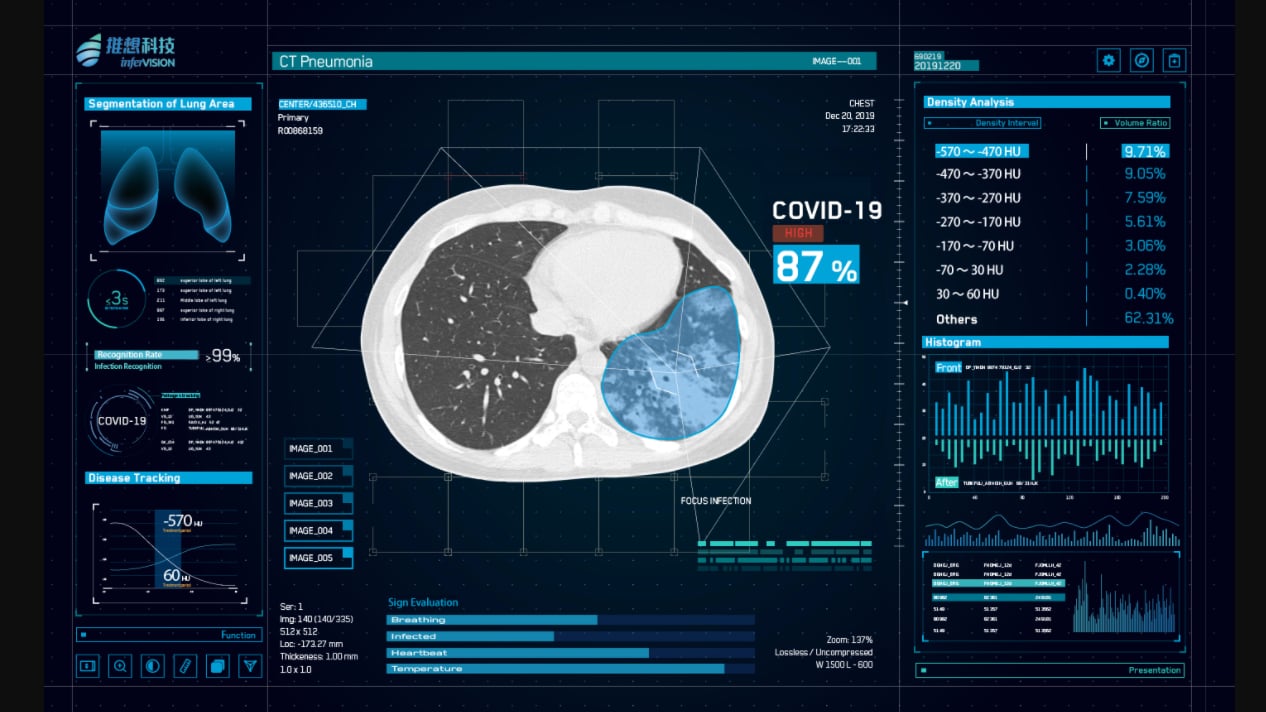
AI vendor Infervision's InferRead CT Pneumonia software uses artificial intelligence-assisted diagnosis to improve the overall efficiency of the radiology department. It is being developed in China as a high sensitivity detection aid for novel coronavirus pneumonia (COVID-19).
February 28, 2020 — New healthcare technologies are being implemented in the fight against the novel coronavirus (COVID-19) outbreak in China. This new tech includes artificial intelligence, analytics software, and using drones to make deliveries to hospitals, according to the healthcare market research firm GlobalData.
The first reports of the 2019 novel coronavirus (2019-nCoV) from Wuhan, China were made Dec. 31, 2019, and it quickly spread to become a global emergency. The number of deaths due to COVID-19 in China has already exceeded the SARS outbreak in 2003. Against this backdrop, tech startups are working with government agencies, clinicians and academics to help contain the outbreak, said GlobalData.
“China is becoming the largest testing ground to demonstrate how emerging technologies can be harnessed to improve epidemic management and minimize the economic impact of the coronavirus outbreak,” explained Venkata Naveen, disruptive tech analyst at GlobalData. “With coronavirus pushing China’s health system into turmoil, the country is deploying tech solutions like never before to overcome its worst crisis in years. The ongoing epidemic has once again reiterated how important emerging technologies are in predicting and combating the spread of infectious diseases.”
The Innovation Explorer database of GlobalData’s Disruptor Intelligence Center reveals various crucial use cases of emerging technologies to fight the coronavirus:
Artificial Intelligence to Monitor Coronavirus Outbreak Analytics
Artificial Intelligence (AI) can be used to identify disease outbreaks as well as forecast their nature of spread. Canadian startup BlueDot used AI and machine learning to detect the coronavirus outbreak even before the Chinese authorities. Its AI algorithm analyzed multiple sources such as news reports, social media platforms and government documents to predict the outbreak.
AI to Help Diagnose Coronavirus on CT Scans
AI developer Infervision launched a coronavirus artificial intelligence solution in China this past month that is tailored for front-line use to help clinicians detect and monitor the disease more effectively. The outbreak has put significant pressure on imaging departments, which are now reading over a thousand cases a day. Patients and clinicians typically have to wait a few hours to get the CT results, but Infervision AI is improving the CT diagnosis speed for each case. The surging number of patients needing diagnosis and the strict laboratory requirements for the use of the rRT-PCR detection kit, to confirm the 2019-nCoV diagnosis, pose big challenges to regional and rural hospitals. Infervision’s tools are helping sites with limited medical resources to immediately screen out suspected Coronavirus-infected patients for further diagnosis and treatment.
Sterilization Robots Help Clean Coronavirus Quarantine Wards
Autonomous sterilization robots are helping hospitals to contain the infections in quarantined wards by easily moving into a quarantined zone to sterilize virus without human intervention. Chinese medical robot developer TMiRob deployed 10 disinfection robots across major hospitals in Wuhan to contain the spread of COVID-19.
Claims Processing To Speed Administrative Paperwork Processing
Blockchain-powered services are helping hospitals to reduce the time spent on administrative work and allocate staff to the frontlines. China’s Xiang Hu Bao, owned by Ant Financial, is offering a blockchain platform to speed up the claims processing, reducing the need for face-to-face contact amidst the coronavirus outbreak.
Drones Offer Aerial Delivery of Medical Supplies In Coronavirus Hit Areas
Drones are gaining popularity as the fastest and safest means to transport supplies during disease outbreaks. Singapore’s AI startup Antwork has launched the first ‘urban air transportation channel’ to deliver medical supplies between Xinchang County People’s Hospital and the county’s disease control center, both located in Zhejiang, one of the most severely coronavirus hit provinces.
Chatbots Used to Pass Along Coronavirus Travel Alerts
Chatbots are becoming the real-time information providers of coronavirus outbreak. Japan’s startup Bespoke has launched a chatbot "Bebot" to offer latest and reliable updates to travelers on the coronavirus outbreak. Accessed through a mobile app, it can answer queries on coronavirus such as symptoms, preventative measures and treatment procedures.
On the other side, China’s tech leaders Baidu, Alibaba and Tencent have also joined the fight against the outbreak. Baidu has open-sourced its RNA prediction algorithm LinearFold to help researchers accelerate the time taken to predict the virus’s RNA secondary structure from 55 minutes to 27 seconds.
Alibaba launched a new AI-based system to detect coronavirus infection via CT scans with an accuracy of up to 96% in less than 20 seconds. Alibaba’s Alipay and Tencent’s WeChat released a feature to track individuals affected with the coronavirus using colored QR codes.
Additional Coronavirus Resources for Clinicians:
• World Health Organization (WHO) COVID-19 situation reports.
• World Health Organization (WHO) coronavirus information page
• U.S. Food and Drug Administration (FDA) COVID-19 information page
• Centers for Disease Control (CDC) COVID-19 information page
Related Coronavirus Content:
The Cardiac Implications of Novel Coronavirus
Radiologists Describe Coronavirus CT Imaging Features
Coronavirus Update from the FDA
CT Imaging of the 2019 Novel Coronavirus (2019-nCoV) Pneumonia
Infervision in the Frontlines Against the Coronavirus
CT Imaging Features of 2019 Novel Coronavirus (2019-nCoV)
Chest CT Findings of Patients Infected With Novel Coronavirus 2019-nCoV Pneumonia
Find more related clinical content Coronavirus (COVID-19)
FDA Resource on the Novel coronavirus (COVID-19)
Mount Sinai Physicians the First in U.S. Analyzing Lung Disease in Coronavirus Patients from China

 August 29, 2024
August 29, 2024 








